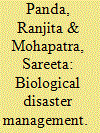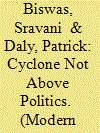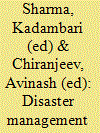|
|
|
Sort Order |
|
|
|
Items / Page
|
|
|
|
|
|
|
| Srl | Item |
| 1 |
ID:
102725


|
|
|
| 2 |
ID:
179411


|
|
|
|
|
| Summary/Abstract |
On 12 November 1970, the Bhola Cyclone swept across the southern districts of East Pakistan, killing over 300,000 people. Small islands were swept away and dead bodies of humans and cattle lay strewn across the devastated landscape. Following the news of the destruction, journalists, students, artists, and political workers rushed to the affected area with basic relief supplies, without waiting for the Military Law Administration (MLA) to intervene. The cyclone's occurrence just three weeks prior to the first general elections in Pakistan added a new dimension to the already simmering political crisis. The extensive media coverage of the disaster brought the pitiful state of infrastructural development and lack of governance in East Pakistan under local and global scrutiny. The cyclone and the corresponding issues soon became embroiled within the larger political demand for regional autonomy. The MLA came under attack from sections of East Pakistan's politicians, press, and public, as well as international political actors, for its poor disaster governance. This article uses the Bhola Cyclone of 1970 as the lens to explore the complex interconnections between environmental disasters and a key issue of governance. While the Bhola Cyclone has been a subject of recent discussions, this article uses a disaster-politics analytical framework to understand the disaster's role in the subsequent political turbulence and the emergence of Bangladesh.
|
|
|
|
|
|
|
|
|
|
|
|
|
|
|
|
| 3 |
ID:
107740


|
|
|
|
|
| Publication |
New Delhi, Jnanada Prakashan, 2010.
|
| Description |
327p.
|
| Standard Number |
9788171393978, hbk
|
|
|
|
|
|
|
|
|
|
|
|
Copies: C:1/I:0,R:0,Q:0
Circulation
| Accession# | Call# | Current Location | Status | Policy | Location |
| 056239 | 363.340954/SHA 056239 | Main | On Shelf | General | |
|
|
|
|
| 4 |
ID:
103264


|
|
|
| 5 |
ID:
155756


|
|
|
|
|
| Summary/Abstract |
Disasters caused by cyclones are a cyclical event in the Bay of Bengal delta seaboard. Periodically, cyclone disasters result in damaged houses and the loss of crops and livelihoods. They affect every type of social and economic infrastructure in the delta, which is inhabited by ostracized backward caste groups – seafarers, forest goers and landless peasants. The 1970 Bhola cyclone, for example, was the most catastrophic, generating a 9.1-meter storm surge at the mouth of the Ganges where it meets the Bay killing approximately 300,000 people. Often, these disasters are declared as ‘natural’ and ‘acts of God.’ This paper tests this epistemic viewpoint. I argue that cyclone-related disasters, like other calamities, cannot be merely viewed as ‘natural’ phenomena. Instead their embeddedness in the social and political relations shaping human habitation on the coastal seaboard endangers human settlement and has made the inhabitants vulnerable since the colonial land reclamation program began in the late eighteenth and early nineteenth century in Bengal. Through examination of competing discourses around ‘natural disasters’, I demonstrate how cyclones are portrayed as natural (rather than human-induced). The naturalization of disaster benefits powerful actors like politicians, civil engineers and contactors, among others. In analyzing the disaster narrative, I go beyond the textual and rhetorical components to include the socio-political and historical bases of the production of ideas of disaster in the Bengal delta. By focusing on the political and social causes of disaster, this paper does not in any way question the ontological reality of cyclones ‘as dangerous and potentially very destructive natural hazards’; instead, it tries to demonstrate how disaster is naturalized in the different strands of state and epistemic discourse.
|
|
|
|
|
|
|
|
|
|
|
|
|
|
|
|
| 6 |
ID:
102727


|
|
|
|
|
|
|
|